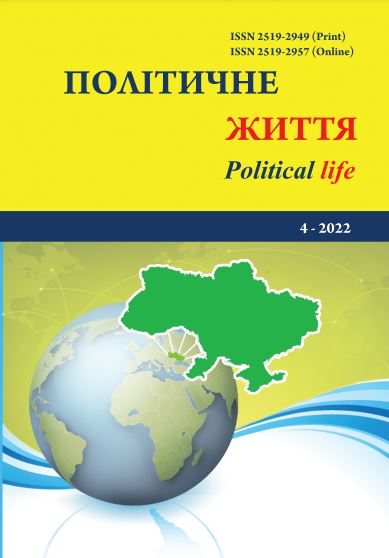Historical and political legal retrospective of formation of the concepts of «border» and «borderland»
DOI:
https://doi.org/10.31558/2519-2949.2022.4.5Keywords:
geopolitical processes; state border; border; borderlands; frontier; border territoriesAbstract
The concepts of «border» and «border territories» are interdisciplinary, have different interpretations, their content depends on the field of application and the field of science in which they are the objects of research. The article reveals the essence of concepts from the point of view of their multidisciplinarity, considers the evolution of the concept of «border», lays the foundation for the theoretical and methodological dimension of the study of border territories in the formation of a new world order and the dynamics of modern political processes.
Borders have been an integral part of life since ancient times, but this category took its modern shape only with the beginning of the formation of national states. The creation of a system of international relations, in which the parties recognize the inviolability of each other’s territory, filled the borders with additional significance. The inviolability of borders has become a fundamental principle of international law, one of the bases of international relations, enshrined in legal documents of the national and international level.
In the process of historical development, the meaning of the notion «border» was constantly changing. Now this term is most often used in the sense of «state border», thus denoting one of the key political institutions around which the system of international relations is built and which is one of the main signs of sovereignty. However, the field of application of the term is only expanding and becoming more complicated. Increasingly, «borders» are explored not in the context of the state and geography, but as dividing lines and spaces of communication in the socio-cultural, informational, and symbolic spheres.
The borderland from an object that was on the periphery of researchers’ attention and was of interest mostly in the context of the expansion of the state, transformed into a phenomenon that representatives of various branches of science study as a type of geopolitical fields, a specific socio-cultural and economic space with a special legal regime.
In further research, the author’s attention will be focused on the study of the peculiarities
of the interaction of border areas with states and other political actors.
References
Введение в исследования границ / под ред. С.В. Севастьянова, Ю. Лайне, А.А. Киреева. – Владивосток: Дальнаука, 2016. – 426 с.
Декларация о принципах международного права, касающихся дружественных отношений и сотрудничества между государствами в соответствии с Уставом Организации Объединенных Наций. URL: https://www.un.org/ru/documents/decl_conv/declarations/intlaw_principles.shtml
(дата звернення: 31.10.2022)
Делимитация и демаркация государственных границ: актуальные вопросы и способы их решения. ОБСЕ, – 2017. URL: https://www.osce.org/files/f/documents/2/8/363471.pdf (дата звернення: 31.10.2022)
Зарицький Т. Парадигма Прикордоння і центр-периферійні підходи. Україна Модерна. – 2011. – № 18. – С. 79–99.
Елацков А.Б. Геополитическое Поле. Актуальные вопросы общественных наук: социология, политология, философия, история: сб. ст. по матер. LIX-LX междунар. науч.-практ. конф, 2016. № 3-4(55), С. 76-80.
Желтов В.В. Границы в условиях глобализации (геополитический аспект). Политическая наука. 2010. No 3. Трансграничные региональные системы: потенциал развития. С.144-145.
Камінська Н.В., Клочков Б.І. Проблеми концептуального визначення поняття державних кордонів у сучасній юридичній науці (Problems of conceptual definition of the concept of state borders in modern legal science). Юридичний часопис Національної академії внутрішніх справ, 2015. №2. С.16-27.
Колосов В.А. Критическая геополитика: основы концепции и опыт ее применения в России. Политическая наука, 2011, №4. С. 31–52.
Кондратенко О.Ю. Геополітика: сутність феномену та його еволюція. Вісник Дніпропетровського університету. Серія: Філософія. Соціологія. Політологія, 2015. № 4. С. 98-107.
Коч С.В. Транскордоння: простір соціального порядку і політичної дії : монографія. Одеса: Фенікс, 2019. 357 с.
Кривицька, О. Лімітрофна ідентичність крізь призму феномена пограниччя. Наукові записки Інституту політичних і етнонаціональних досліджень ім. І.Ф. Кураса НАН України, no. 3/4 (83/84), 2016. С. 298–313.
Леконцева К.В. Философско-социологические подходы к изучению трансграничья. URL: http://www.rusnauka.com/36_PVMN_2012/Psihologia/14_119105.doc.htm (дата звернення: 30.10.2022).
Лепська Н.В. Простір як фундаментальна категорія в теоріях німецько-центричної геополітики. Політичне життя. 2017. № 4. – С. 108-114.
Міжнародне право : [навч. посіб.] / Буроменський М. В., Кудас І. Б., Маєвська А. А. та ін. ;
[за заг. ред. М. В. Буроменского]. – К. : Юрінком Інтер, 2005. – 336 с.
Міжнародне право: Основні галузі / За ред. В.Г. Буткевича. – К.: Либідь, 2004. – 816 с.
Плешаков К. В. Геополитика в свете глобальных перемен. Международная жизнь, 1994. № 10.
С. 32–34.
Про державний кордон України. Закон України від 4 листопада 1991 р. № 1777-ХІІ. URL: https://zakon.rada.gov.ua/laws/show/1777-12#n9 (дата звернення: 31.10.2022).
Тернер Ф.Дж. Фронтир в американской истории/ Пер. с англ. – М.: Издательство «Весь Мир», 2009. 304 с.
Хаусхофер К. О геополитике: работы разных лет. – М.: Мысль, 2001. – 426 с.
Prescott J.R.V. Political frontiers and boundaries. London; New York. Routledge. 2015. 315 p.
Regulation (EC) N 1931/2006 of the European Parliament and of the Council of 20 December 2006 laying down rules on local border traffic at the external land borders of the Member States and amending the provisions of the Schengen Convention // Official Journal. L 405. 2006.

